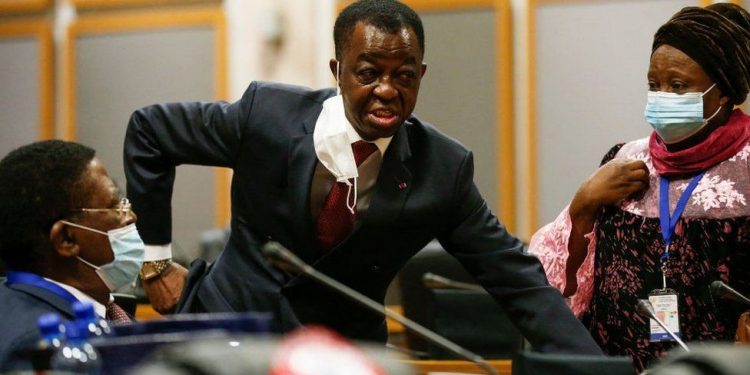Founded with the noble ambition of uniting the continent, a session of the Pan-African Parliament (PAP) recently descended into farce with some members fighting and threatening to kill each other.
The ugly scenes came amid sharp divisions over who the next president of the 235-member parliament should be, with southern African delegates insisting that their candidate should be chosen to end the dominance of other regions.
“I will kill you,” said South African MP Julius Malema, pointing his finger at a rival MP in an outburst that was caught on camera. He later defended his comments, saying he had been threatened.
During another sitting, there were chants of: “No rotation. No voting. No election. Simple!” while members jostled for ballot boxes. As the chaos continued, some of the politicians exchanged blows, while someone could be heard shouting: “Please call the police, it is urgent.”
In a BBC interview, Zimbabwean MP Barbara Rwodzi said she was injured on her left arm – which had to be bandaged – during the “battle” that took place at the parliamentary session held on the edge of the Gallagher Estate convention complex in South Africa’s economic heartland of Gauteng.
To critics, it was an embarrassing spectacle.
“We are more divided as a continent than we ever have been – that’s the reality. We parade this false solidarity in the face of great injustice. We have ‘sit-tight presidents’ and ‘presidents for life’,” Professor Lesiba Teefu, a political analyst attached to the University of South Africa, was quoted by Africa News Agency as saying.
“We don’t criticise each other. We have been experimenting with liberation for almost 60 years now and we are no closer to unity.”
The formation of the parliament 17 years ago was part of a grand plan forged by some of Africa’s then-leaders, including Libya’s Muammar Gaddafi, to unite a continent made up of more than 50 states.
They envisaged that the African Union (AU) would spearhead the formation of a single government, with the parliament serving as its legislative arm. But, when it is not a boxing ring, the parliament is – as the South African Institute for Security Studies think-tank puts it – nothing more than a “glorified talk shop”.
Senegalese MP Toussaint Manga told the BBC that a large part of the problem was the fact that only 11 of the AU’s 54 member-states had ratified a 2014 agreement – known as the Malabo protocol – to give the parliament legislative power. At least 28 countries are needed. “If we really want to move this parliament forward, the countries need to ratify and grant the parliament full powers,” he said.















